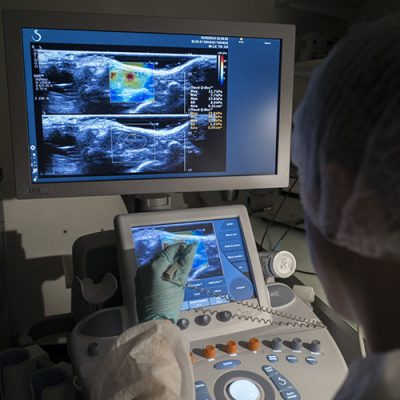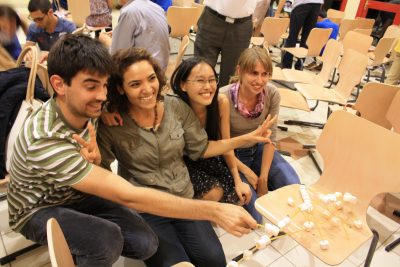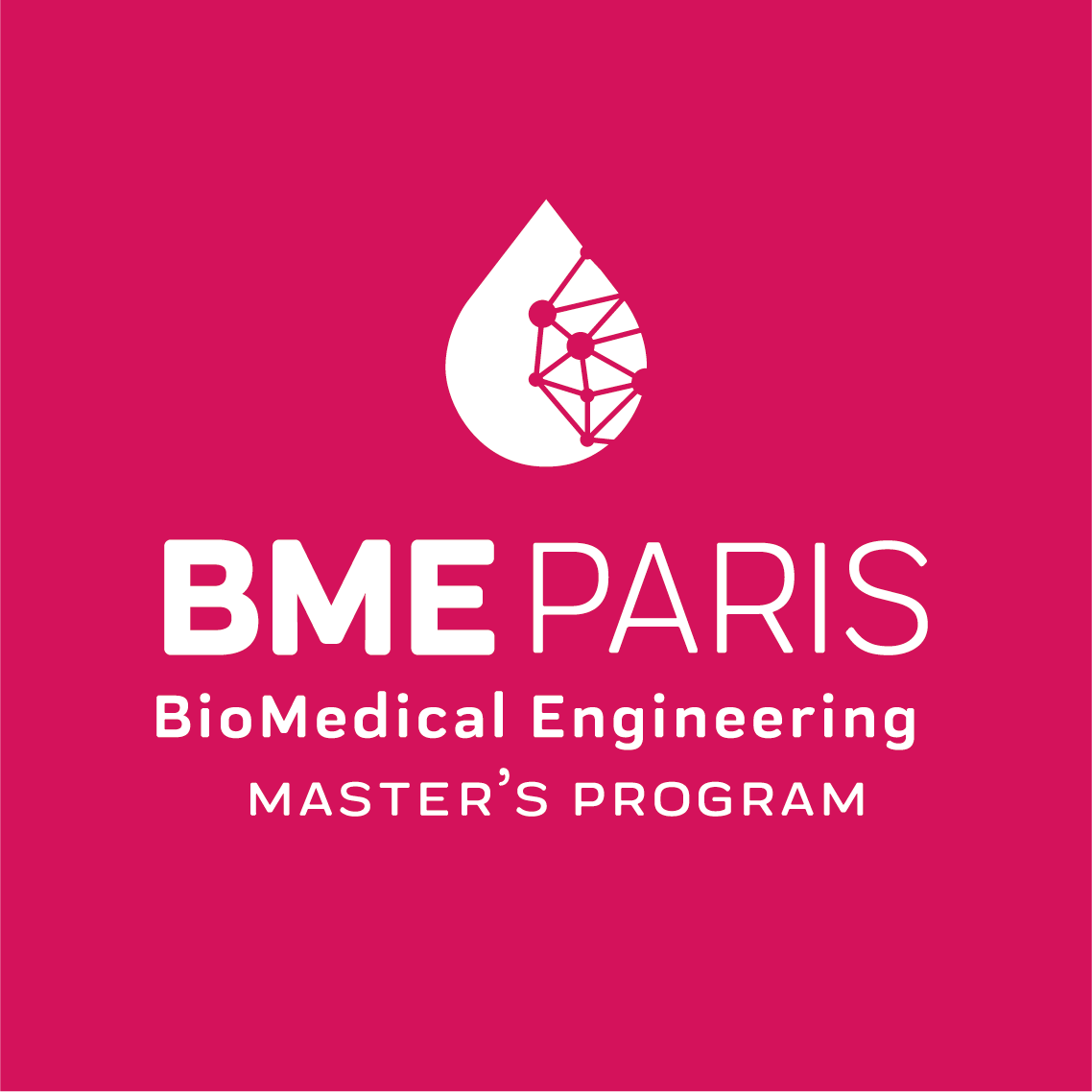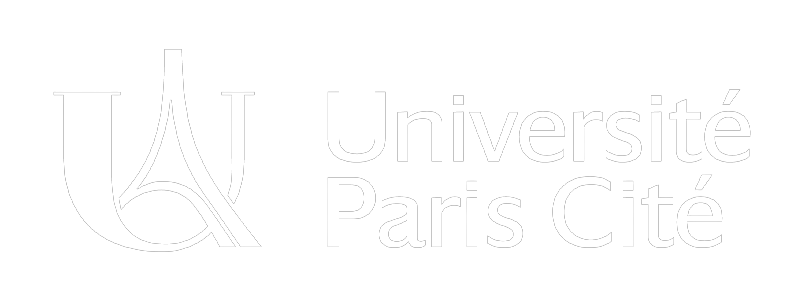BioImaging
BioImaging (BIM)
BioImaging is an exciting and  growing field overlapping the interfaces of engineering, mathematics and computer science, as well as chemistry, physics, life science, and medecine. The main goal of bioimaging is to improve human health by using imaging modalities to advance diagnosis, treatment, and prevention of human diseases.
growing field overlapping the interfaces of engineering, mathematics and computer science, as well as chemistry, physics, life science, and medecine. The main goal of bioimaging is to improve human health by using imaging modalities to advance diagnosis, treatment, and prevention of human diseases.
The BIM track offers high-level interdisciplinary education and training supported by the complementary skills of Université Paris Cité and Arts et Métiers Institute of Technology. A large network of research laboratories provides students access to industrial and experimental imaging systems that utilize innovative technologies.
The BIM track is accessible to engineering and life-science students (medicine, pharmacology, biology, chemistry, biochemistry, physics) preparing for career paths in academic research or industrial R&D environments. It relies on close collaboration between Université Paris Cité, Arts et Métiers Institute of Technology in partnership with Telecom Paris.
The third semester (S3) of the BIM curriculum itself consists of six courses (UE) at the M2 level that are organized, taught, and overseen by faculty members expert in the appropriate fields.
During the S3, students select five 6-ECTS courses (UE). The set of each student’s elective courses is determined according to his/her professional objectives and approved by their track advisor.
The fourth semester (S4) is mainly devoted to complementary skills and the internship (30 ECTS).
Semester 3
Course Title: Medical Image Analysis
Description: The main objective of this course is to provide the students with the means to understand and use the most common tools used in bio-medical image analysis, this will include notions about the sampling and quantification of images, image filtering, mathematical morphology, image segmentation, video sequences & motion processing, 3-D Image processing, and short introduction to the extraction/measurement of quantitative features and pattern recognition.
Key words: Image processing, Bio-medical images,
Total number of hours: 44 Number of ECTS: 6 Semester 3
Mandatory course ☒ Optional course ☐
Prerequisites/skills needed: This course requires familiarity with basic mathematics: Linear algebra: linear equations, vectors, matrices; Analysis: continuous function, graph of a function, basic notions of differentiation and integration; Geometry: point, segment, line, curve, surface; Probabilities: probability distribution. Engineers are expected to have some basic knowledge in programming with Python, Java or C/C++. Basic knowledge about numerical analysis is also expected.
Teaching methods and activities: Lectures (CM), practical sessions (TD), other: project
Location: ENSAM
Course supervisor: Florence CLOPPET (associate professor), Laurent Gajny (associate professor)
Course Title: Physics for BioImaging
Description: The objective of this course unit is to introduce students to the physical concepts underlying the main medical imaging techniques, their applications, as well as recent innovations and development directions in these techniques. The course is divided into three parts. The first part is dedicated to magnetic resonance imaging, the second to techniques using ionizing radiation (CT and PET scans), and the third to ultrasound imaging. The classes are taught by several expert instructors who are biomedical engineers, medical physicists, or radiologist- researchers and clinicians. Engagement and interaction between instructors and students are encouraged.
Key words: MRI, X-rays, ultrasound
Total number of hours: 40 Number of ECTS: 6 Semester 3
Mandatory course ☐ Optional course ☒
Prerequisites/skills needed: Principles of Fourier Transforms, notions of physics (electromagnetism, spin magnetic moments, wave propagation, radiation
Teaching methods and activities: Lectures (CM), practical sessions (TD)
Location: Université Paris Cité – Campus St Germain – 45 Rue des Saints Pères – 75006 Paris
Course supervisor: Lori BRIDAL (PhD/MD), Mathilde WAGNER (PhD/MD), Constance DE MARGERIE (PhD)
Under construction
Course Title: Optics for bioimaging
Description: This course explores advanced principles and cutting-edge techniques in bio-imaging and photonics. Students will delve into the fundamentals of light-matter interaction, gaining insights into super-resolution microscopy and single-molecule localization methods. The curriculum includes adaptive optics for enhancing imaging precision, photo-acoustic imaging techniques for visualizing deep tissues, and computer-generated holographic photostimulation using optogenetic tools. These interdisciplinary topics tackles complex current challenges in modern biological research and imaging science.
Key words: optical microscopy, super-resolution microscopy, holography
Total number of hours: 12 Number of ECTS: 3 Semester 3
Mandatory course ☐ Optional course ☒
Prerequisites/skills needed: Basics of optics
Teaching methods and activities: Lectures (CM), lab sessions (TP)
Location: Université Paris Cité – Campus St Germain – 45 Rue des Saints Pères – 75006 Paris
Course supervisor: Marc GUILLON (Associate Professor)
Course Title: Quantification for Bioimaging
Description: The lecture provides basic knowledge about the key-concepts of the bioimaging analysis from optical microscopy. It is composed of 5 classes divided in a theorical part and pratical part by manipulating images under the Icy platform : Part 1: General overview of the bioimaging analysis and basic concepts: Part 2: Spot detection and tracking (intra-cellular particles) Labeling intra-cellular particles (virus, endosomes, etc.) can be seen as spots in noisy background. We will present the approaches of Part 3: Cell detection and tracking from video microscopy sequences (deformable models) Presentation of the interest of the detection and analysis from video microscopy sequences Part 4: Digital pathology (color representation, color image processing, big data)
Key words: Spot Detection, Cell Detection, Tracking, Video-microscopy, Digital Pathology
Total number of hours: 20 Number of ECTS: 6 Semester 3
Mandatory course ☐ Optional course ☒
Prerequisites/skills needed: None
Teaching methods and activities: Lab sessions (TP) ☐ lectures (CM) ☒ practical sessions (TD) ☒ other☒ specify: personal assignment
Location: ENSAM
Course supervisor: Vannary MEAS-YEDID (Research Engineer (Pasteur Institute))
Course Title: Molecular Imaging of the Body
Description: Molecular Imaging is non invasive in vivo biochemistry: in vivo means real-life environment, non invasive means repeatable, molecular biology (~biochemistry) means relevant to molecular diseases such as cancer, inflammation, cardiovascular diseases, etc. The course will present practical up-to-date examples of Whole body, 3D, Quantitative, Dynamic and Multiplexed molecular imaging research and achievements.
Key words: Molecular imaging, molecular medicine, experimental imaging
Total number of hours: 20 Number of ECTS: 3 Semester 3
Mandatory course ☐ Optional course ☒
Prerequisites/skills needed: Interest for Molecular aspects of life
Teaching methods and activities: Lectures (CM), other: personal assignment
Location: Campus Saint Germain – Université Paris Cité
Course supervisor: Bertrand TAVITIAN (PUPH – Université Paris Cité – HEGP) and François ROUZET (PUPH – Université Paris Cité – Bichat)
Course Title: Functional Imaging of the body
Description: This course provides a general introduction to functional and metabolism imaging techniques (fMRI, Diffusion MRI and PET) and concrete examples of clinical applications with hands-on experience of processing data on clinical routine workstations. It is composed of 2 parts organized as follows: 1. Brain Imaging: General introduction of Imaging techniques and associated clinical applications (PET, – Functional neuroimaging, Diffusion-weighted magnetic resonance imaging) and Hands-on on Image analysis of clinical cases on routine workstations (Perfusion MRI and PET: multimodality fusion on several clinical cases, Diffusion imaging and fMRI: Application to brain tumors) 2. Body Imaging: Introduction to the concept of functional and metabolism imaging (MRI, CT and ultrasound), Imaging of MRI diffusion, Quantitative imaging of microcirculation (A hands-on session is proposed using a digital microcirculation simulator), Imaging of tissue elasticity (Elastography) by MRI and ultrasound. Radiomics (principles and methodology): the links with other -omics are explained and the relationship with the phenotype is explored. Notions illustrated by applications related to different organs: liver, ENT organs, kidneys … and cancerous tumors. The applications related to the prognosis of the lesions and the evaluation under treatment are also described.
Key words: Brain Imaging, Body Imaging, MRI Diffusion, Elastography, Radiomics, Multimodality
Total number of hours: 24 Number of ECTS: 3 Semester 3
Mandatory course ☐ Optional course ☒
No prerequisites/skills needed
Teaching methods and activities: Lectures (CM), practical sessions (TD)
Location: Université paris cité – Campus Saint-Germain-des-Prés
Course supervisor: Charles-André CUENOD (PU-PH)
Course Title: Chemical probes and Nanomedicine
Description: The analytical chemistry tools for biomedical imaging projects course brings expertise to use imaging probes and nanoparticles wisely in real biomedical projects. The chemical probes and nanomedicine for bioimaging course is dedicated to engineers, physicists, physicians, biologists, chemists. It brings expertise in chemical properties of imaging probes used and recently developed in medical and biomedical imaging, in particular imaging of molecular events using chemical imaging agents. The students will learn the formulation, route of administration, biodistribution associated with the methods of acquisition of imaging in all the modalities (MRI, Ultrasound, Optics, Nuclear Medicine, EPR, CT). This expertise will be dedicated to solve problematics for observing, targeting, diagnose and curing diseases, via molecular biomarkers (pH, ROS, receptors, enzymes…) for molecular level investigation of normal and pathological biological tissue. Their application will be illustrated with recent biomedical applications in preclinics and clinics. Key words: Innovative Probes, biological investigation, Nanomedicine, Pre-clinical and Clinical Diagnosis.
Key words: Chemical probes, nanomedicine, molecular diagnosis, engineering biomaterials
Total number of hours: 18 Number of ECTS: 3 Semester 3
Mandatory course ☐ Optional course ☒
Prerequisites/skills needed: Chemistry basics, nanoparticles, optical and NMR spectroscopy basics
Teaching methods and activities: Lectures (CM), practical sessions (TD)
Location: Université Paris Cité Saint Germain, 45 rue des Saints Pères, 75006 Paris
Course supervisor: Bich-Thuy DOAN (Dr), Yves FRAPART (Dr)
Course Title: Practical Training: from interdisciplinary science to biomedical research projects
Description: The analytical chemistry tools for biomedical imaging projects course brings expertise to use imaging probes and nanoparticles wisely in real biomedical projects. The practical training unit provides practical work to familiarize with different experimental methods used in biomedical engineering. The practical work is conceived as an illustration of the lectures, but also as a preparation for the laboratory experimental internship of the second trimester. Most of the practical work comes from and is based on research carried out in the host laboratories. Each student will choose one scientific project from a list (see below), that will take place on 4 consecutive practical sessions of 4h each and will conclude with an oral restitution.
Example of projects (that may evolve over the years):
– Magnetic cells labelling for cell tracking and tissue engineering- MRI monitoring.
– Follow-up of functionalized gold nanoparticle by Raman spectroscopy: from cells to extracellular vesicles.
– Bioproduction and characterization of cell-free nanobiotherapies.
– Organ Culture, Physiology & Immunohistochemistry.
– Discovering and studying chicken embryos.
Key words: Nanomedicine, Nanoparticles, Tissue Engineering, MRI, Imaging, Drug Delivery, Morphogenesis, Biophysics, Extracellular Vesicles, Raman spectroscopy
Total number of hours: 20 Number of ECTS: 3 Semester 3
Mandatory course ☐ Optional course ☒
Prerequisites/skills needed: None
Teaching methods and activities: Lectures (CM)
Location: Université Paris Cité – Campus Saint-Germain des Prés (Projects 2, 3, 5), ENSCP (Project 1), Université Paris Cité – Campus Grands-Moulins (Project 4).
Course supervisor: Kelly AUBERTIN (Dr), Sarah RAZAFINDRAKOTO (IGE)
Course Title: Machine Learning for Bioimaging
Description: This course provides an overview of machine learning techniques, both old and new, applied to various medical image analysis tasks (landmarking, detection, segmentation…). The goal of this course is to develop skills in selecting the appropriate machine learning technique for a given task, coding it with best practices, and evaluating it fairly and thoroughly. In the 6 sessions of 4 hours each, we will cover theoretical aspects that are immediately applied in practical coding exercises. Students will be asked to complete a project for which a short report, a public code repository and a defense will be evaluated. This course is part of the 6-ECTS block “Computing for bioimaging”.
Key words: Machine learning, Biomedical images, Computer vision.
Total number of hours: 24 Number of ECTS: 3 Semester 3
Mandatory course ☐ Optional course ☒
Prerequisites/skills needed: This course requires familiarity with basic mathematics (linear algebra, numerical analysis, geometry, probabilities) and classical image processing techniques. Basic knowledge in programming (Python, Java or C/C++). is also expected for engineers. Clinicians selecting this course must be willing to learn coding and to face equations.
Teaching methods and activities: lectures (CM) ☒ practical sessions (TD) ☒ other☒ specify: project
Location: ENSAM
Course supervisor: Laurent GAJNY (Associate Professor), Loïc LE FOLGOC (Associate Professor)
Course Title: Quantification for Diagnosis: Industrial and Medical Applications in Medical Image Analysis
Description: The objective of the course is to provide the students with a panorama of several clinical and industrial applications in medical image analysis. Courses are taught by academic researchers, industrial researchers and clinicians working on the same clinical problem. They will show how advanced computer-vision, modeling and machine-learning methods are designed, validated and used in clinical software tools to support diagnosis with quantitative biomarkers.
Key words: medical imaging modalities (MRI, US, X-ray and CT), advanced image processing, deep-learning, software tools, clinical applications
Total number of hours: 24 Number of ECTS: 3 Semester 3
Mandatory course ☐ Optional course ☒
Prerequisites/skills needed: basic knowledge of image processing and medical imaging (i.e. MIA: Medical Image Analysis Course)
Teaching methods and activities: Lectures (CM), practical sessions (TD), other ☒ specify: individual assignment (report) with oral presentations
Location: Université Paris Cité Saint Germain, 45 rue des Saints Pères, 75006 Paris
Course supervisor: Elsa ANGELINI (Professor), Loïc LE FOLGOC (Associate Professor)
Course Title: Research methodology
Description: This course aims to equip master’s students in biomedical engineering with essential skills for conducting rigorous scientific research and generating both applied and fundamental knowledge. Research methodology encompasses a broad array of professional practices applicable across settings, from academic institutions to corporate research environments. It involves competencies in planning and executing research, analyzing data, validating hypotheses, and translating findings into publications and presentations for wide dissemination and application. The course is offered at two levels—basic and advanced. The basic level introduces fundamental statistical tools for quantitative research, emphasizing statistical hypothesis testing, with practical sessions. It also covers core principles of scientific writing and the publication process. The advanced level delves into machine learning, Bayesian approaches, advanced scientific writing, and publication strategies. Students will also develop skills in data visualization, data management, coding standards, and science communication, emphasizing open science and responsible research practices.
Key words: Scientific approaches, statistics, article writing, literature review
Total number of hours: 24 Number of ECTS: 3 Semester 3
Mandatory course ☐ Optional course ☒
Prerequisites/skills needed: An innate curiosity and thirst for science. A solid background in statistics and mathematics is required to join the advanced group on machine learning
Teaching methods and activities: ☒ lectures (CM) ☒ practical sessions (TD) ☒
Location: ENSAM
Course supervisor: Claudio VERGARI (Professor), Pierre-Yves ROHAN (Associate Professor), Samuel BOTTANI (Professor)
Semester 4
Course Title: Ethical, Industrial and Environmental aspects in biomedical enginnering
Description: This UE aims at giving an introduction to the economical and industrial aspects of biomedical engineering. Based on current main regulations and standards, it addresses questions such as regulatory registration, certification, intellectual property, resources planning and allocation (time, financial), environmental (management of product lifetime cycle and environmental footprint) and social concerns (ethical work policy and consideration of geopolitical environment), and project management. Several examples including real industrial projects are used to illustrate the course. The course offers theoretical lectures and a group project to apply those concepts
Key words: Industry, regulation, business planning
Total number of hours: 20 Number of ECTS: 3 Semester 4
Mandatory course ☒ Optional course ☐
Prerequisites/skills needed: None
Teaching methods and activities: lectures (CM), practical sessions (TD)
Location: ENSAM
Course supervisor: Guillaume DUBOIS (PRAG), Claudio VERGARI (Professor)





